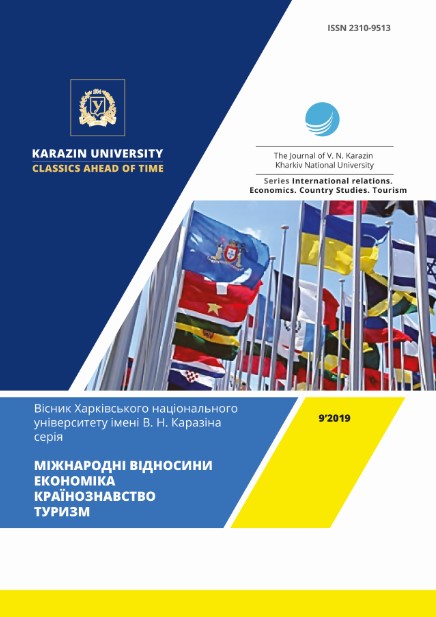Assessment of the social component of the effectiveness of the transition to alternative energy sources
Abstract
Energy conservation is a key focus of the green economy. The correct energy conservation policy of a country can significantly increase its competitiveness of the national economy. The aim of the article is a meaningful definition of the energy saving process, a qualitative and quantitative assessment of the social component of the effectiveness of the transition to alternative energy sources. Objective: study of one of the promising measures of energy conservation policy - attracting renewable energy sources in economic activity. General scientific methods are used: system analysis - to determine the features of the development of energy saving in Ukraine, comparative analysis to formalize the cause-effect relationships of the studied factors of the influence of renewable energy sources on the country's economic activity. It is determined that energy saving should be understood as the process of ensuring the rational use of energy resources in economic activity with minimizing environmental damage through the implementation of a set of measures (regulatory, scientific, practical, financial, economic, organizational, technical, informational, educational and innovative). The classification of measures in the field of energy conservation is systematized. In order to stimulate the development of "green" energy in the regions, the need is substantiated, together with the calculation of economic and environmental effects, to assess the social effect of the introduction of alternative energy. Conclusions: the proposed approach for calculating the social effect of the use of renewable energy sources is based on qualitative and quantitative characteristics that affect social changes in society during the transition to renewable energy sources. The proposed formula for assessing the social effect is of significant economic importance and can be used to justify the effectiveness of the development of renewable energy.
Downloads
References
Zakon Ukrainy «Ob energosberezhenii» [The Law of Ukraine “On Energy Saving”]. Available at: http//zakon.rada.gov.ua/go/74/94 (accessed 10 January 2020).
Andrizhiyevskiy, A. A., Volodin, V. I. (2005). Energosberezheniye i energeticheskiy menedzhment [Energy Saving and Energy Management]. Minsk: Vysheysh. shk., 294 s. (in Russian)
Hordiyenko, O.S. (2012). Enerhozberezhennya transportnykh pidpryyemstv [Energy Saving of Transport Enterprises]. Tekhnolohycheskyy audyt y rezervy proyzvodstva [Technological audit and production reserves]. No 1 (7). T. 5, pp. 13–14. (in Ukrainian)
Kosheva, H.O. (2011). Derzhavni mekhanizmy upravlinnya enerhozberezhennyam [State mechanisms of energy saving management] (PhD Thesis), Donets. derzh. unGt. upr. Donetsk, 20 p. (in Ukrainian)
Mataras, Ye. V., Olekhnovich, Ye. V. (2007). Realizatsiya osnovnikh protses sov energosberezheniya v Respublike Belarus' [Realization of the main energy saving processes in the Republic of Belarus]. Studencheskiy vestnik [Student Bulletin]. No 10. (in Russian)
Hapryndashvili, B.V. (2014). Enerhozberezhennya yak chynnyk pidvyshchennya konkurentospromozhnosti promyslovykh pidpryyemstv [Energy saving as a factor in increasing the competitiveness of industrial enterprises]. Biznes Inform [Business Inform], No 8, pp. 213–217. (in Ukrainian)
Dokunina, K.I. (2012). Teoretychni aspekty formuvannya ekonomichnoho mekhanizmu enerhozberezhennya [Theoretical aspects of the formation of the economic mechanism of energy saving]. Komunalʹne hospodarstvo mist [Utilities of cities]. No. 106, pp. 341–350. (in Ukrainian)
Mikhaylov, S. A., Meshalki, V. P., Balyabina, A. A. (2009). Mesto strategii energosberezheniya v strategii sotsial'noGekonomicheskogo razvitiya regiona [The place of energy saving strategies in the strategy of socio-economic development of the region]. Menedzhment v Rossii i za rubezhom [Management in Russia and abroad]. No 2, pp. 22–30. (in Russian)
Timofeyev, V. N., Nemirovskiy, I. A. (2007). Energomenedzhment i energosberezheniya – obshchnost' i otlichiya [Energy management and energy conservation –community and differences]. Energosberezheniye. Energetika. Energoaudit [Energy saving. Energy Energy audit]. No 5, pp. 32–37. (in Russian)
Danilov, O. L., Kostyuchenko, P. A. (2006). Prakticheskoye posobiye po vyboru i razrabotke energosberegayushchikh proyektov [Practical guide on the selection and development of energy-saving projects]. M.: ZAO «Tekhnopromstroy», 668 p. (in Russian)
Babenko, V., Sidorov, V., Koniaieva, Y., Kysliuk, L. (2019). Features in scientific and technical cooperation in the field of nonGconventional renewable energy. Global Journal of Environmental Science and Management, 5 (Special issue), pp. 105-112. doi: http://dx.doi.org/10.22034/gjesm.2019.05.SI.12
Babenko V., Koniaieva Y. (2019). Prospects for improving technology in nonGconventional energy development. Visnik of V. N. Karazin Kharkiv National University. Chap. International Relations. Economics. Country Studies. Tourism (IRECST), vol. 9, рр. 92-99. doi: 24.26565/2310-9513-2019-9-11
Koniaieva, Yelyzaveta G., Babenko, Vitalina A. (2019). Determining priorities of scientific and technical cooperation between Ukraine, the EU and Chile in the field of nonGconventional renewable energy sources. Acta Innovations, No 32, pp. 40-50. doi: https://doi.org/10.32933/ActaInnovation s.32.5
Sergeyev, N.N. (2013). Metodologicheskiye aspekty energosberezheniya i povysheniya energeticheskoy effektivnosti promyshlennykh predpriyatiy [Methodological aspects of energy conservation and energy efficiency of industrial enterprises]: monografiya. Izhevsk: Udmurt. Un-t, 116 p. (in Russian)
Nimechchyni vdalosya zabezpechyty 85% enerhiyi z alʹternatyvnykh dzherel [Germany has managed to provide 85% of its energy from alternative sources]. Available at: https://nachasi.com/2017/05/10/germany-energy/ (accessed 25 January 2020).
Klavdiyenko, V.P. (2010). Innovatsii i «ozeleneniye» ekonomiki SSHA [Innovation and greening the US economy]. Innovatsii [Innovation]. No 12, pp. 14–18. (in Russian)
Strel'tsov, D.V. (2010). Politika Yaponii v sfere energosberezheniya: istoricheskiye i pravovyye aspekty [Energy Policy of Japan: Historical and Legal Aspects]. Vostochnaya analitika [Eastern analytics]. No 1, pp. 56–64. (in Russian)
Minekoenergo. Available at: http://mpe.kmu.gov.ua/minugol/control/publish/article?art_id=245428807 (accessed 3 February 2020).
Authors who publish with this journal agree to the following terms:
- Authors retain copyright and grant the journal right of first publication of this work under the terms of a license Creative Commons Attribution License 4.0 International (CC BY 4.0).
- Authors are able to enter into separate, additional contractual arrangements for the non-exclusive distribution of the journal's published version of the work (e.g., post it to an institutional repository or publish it in a book), with an acknowledgement of its initial publication in this journal.
- Authors are permitted and encouraged to post their work online (e.g., in institutional repositories or on their website) prior to and during the submission process, as it can lead to productive exchanges, as well as earlier and greater citation of published work.




